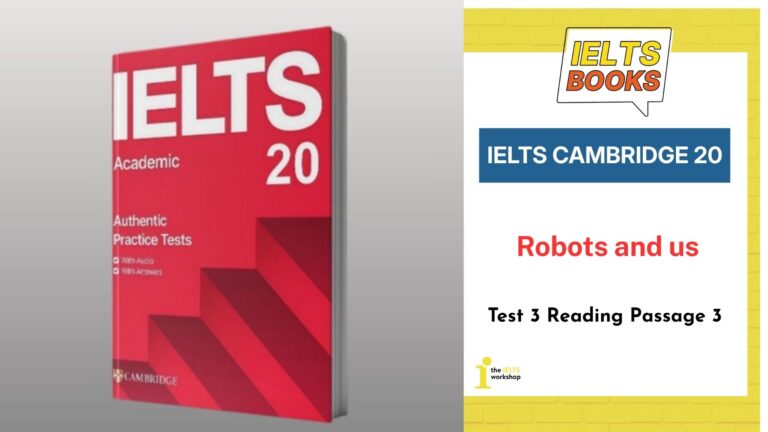Hy vọng rằng phần đáp án và phân tích chi tiết trong bài viết đã giúp bạn hiểu rõ hơn về cách làm bài hiệu quả trong IELTS Cambridge IELTS 20 Test 3 Reading Passage 3: Robots and us. Việc luyện tập thường xuyên với các bài test chuẩn như thế này không chỉ giúp bạn cải thiện điểm số mà còn tăng sự tự tin khi bước vào kỳ thi thật.
Đáp án IELTS Cambridge 20 Test 3 Reading Passage 3
| Câu hỏi | Đáp án |
|---|---|
| 27 | A |
| 28 | C |
| 29 | B |
| 30 | C |
| 31 | B |
| 32 | A |
| 33 | C |
| 34 | C |
| 35 | B |
| 36 | D |
| 37 | B |
| 38 | C |
| 39 | B |
| 40 | C |
Phân tích chi tiết IELTS Cambridge 20 Test 3 Reading Passage 3
Question 27. A
Câu hỏi: For our own safety, humans will need to restrict the abilities of robots. (Để đảm bảo an toàn cho con người, cần hạn chế khả năng phát triển của robot.)
Vị trí: Đoạn 7
Transcript: “I think we should ensure that robots remain as no more than ‘idiot savants’ lacking the capacity to outwit us, even though they may greatly surpass us in the ability to calculate and process information.”
Phân tích: Martin Rees cảnh báo rằng dù robot có thể tính toán nhanh vượt bậc, nhưng con người nên kiểm soát và giữ chúng ở mức không thể vượt mặt chúng ta. Điều này phản ánh việc cần giới hạn khả năng của chúng để đảm bảo an toàn.
Question 28. C
Câu hỏi: The risk of robots harming us is less serious than humans believe it to be. (Nguy cơ robot gây hại có thể không lớn như con người hình dung.)
Vị trí: Đoạn 6.
Transcript: “One of the consequences of thinking that the problem lies with machines is that … we tend to imagine they are greater and more powerful than they really are and subsequently they become so.”
Phân tích: Richardson cho rằng con người thường gán cho máy móc sức mạnh vượt quá thực tế, điều này tạo ra nỗi sợ hãi không cần thiết về nguy cơ robot đe dọa nhân loại.
Question 29. B
Câu hỏi: It will take many decades for robot intelligence to be as imaginative as human intelligence. (Phải mất rất nhiều năm nữa robot mới có thể sáng tạo như con người.)
Vị trí: Đoạn 5.
Transcript: “Expecting a machine close to the creative intelligence of a human within the next 50 years would be highly ambitious.”
Phân tích: Daniel Wolpert khẳng định rằng việc kỳ vọng robot đạt được mức sáng tạo như con người trong vòng 50 năm là quá lạc quan – tức là vẫn cần nhiều thập kỷ để đạt được điều đó.
Question 30. C
Câu hỏi: We may have to start considering whether we are treating robots fairly. (Có lẽ đã đến lúc suy ngẫm xem chúng ta có đang đối xử công bằng với robot hay không.)
Vị trí: Đoạn 4.
Transcript: “Moral questions then arise … Should we feel guilty about exploiting [sophisticated robots]? Should we fret if they are underemployed, frustrated, or bored?”
Phân tích: Richardson đặt ra các vấn đề đạo đức liên quan đến việc sử dụng robot, thể hiện sự quan tâm tới việc đối xử công bằng và nhân văn với các hệ thống máy móc phức tạp.
Question 31. B
Câu hỏi: Robots are probably of more help to us on Earth than in space. (Robot có thể hữu ích hơn khi được sử dụng trên Trái Đất thay vì trong không gian.)
Vị trí: Đoạn 2.
Transcript: “The vast majority of Earth is currently inaccessible to us. Using robots to gather resources nearer to home would seem to be a better use of our robotic tools.”
Phân tích: Wolpert gợi ý rằng thay vì đưa robot ra ngoài vũ trụ, sử dụng chúng để khai thác những khu vực khó tiếp cận trên Trái Đất là thiết thực và hợp lý hơn.
Question 32. A
Câu hỏi: The ideas in high-quality science fiction may prove to be just as accurate as those found in the work of mediocre scientists.
(Những ý tưởng trong truyện khoa học viễn tưởng chất lượng cao đôi khi chính xác ngang bằng với nghiên cứu của các nhà khoa học trung bình.)
Vị trí: Đoạn 10.
Transcript: “I sometimes advise students that it’s better to read first-rate science fiction than second-rate science – more stimulating, and perhaps no more likely to be wrong.”
Phân tích: Rees khuyến khích sinh viên đọc tiểu thuyết khoa học viễn tưởng hàng đầu vì chúng có thể truyền cảm hứng và cũng có mức độ chính xác tương đương với các nghiên cứu khoa học không quá xuất sắc.
Question 33. C
Câu hỏi: There are those who look forward to robots developing greater intelligence. (Có nhiều người mong muốn robot sẽ trở nên thông minh hơn nữa.)
Vị trí: Đoạn 9.
Transcript: “Not all fear [robots]; many people welcome machine intelligence.”
Phân tích: Richardson chỉ ra rằng không phải ai cũng sợ robot, thậm chí có người vui mừng đón nhận sự phát triển của trí tuệ máy móc – cho thấy có sự kỳ vọng tích cực.
Question 34. C
Câu hỏi: Richardson and Rees express similar views regarding the ethical aspect of changes made to other planets for our own benefits.
(Richardson và Rees có quan điểm giống nhau về mặt đạo đức trong việc con người can thiệp vào các hành tinh khác nhằm phục vụ lợi ích riêng.)
Vị trí: Đoạn 1 (Rees) & Đoạn 3 (Richardson).
Transcript:
Rees: “… colonised planets should be preserved with a status that is analogous to Antarctica here on Earth.”
Richardson: “… whether we do something on Earth or on Mars we should always do it … not to impose a particular model, but to meet ‘the Other’.
Phân tích: Cả hai đều cho rằng việc thay đổi hành tinh vì lợi ích con người cần được xem xét cẩn trọng về mặt đạo đức, nên có cách tiếp cận tôn trọng và bảo tồn.
Question 35. B
Câu hỏi: Rees and Wolpert share an opinion about the extent of advances made in machine intelligence so far. (Rees và Wolpert đồng ý về mức độ phát triển hiện tại của trí tuệ nhân tạo.)
Vị trí: Đoạn 4 (Rees) & Đoạn 5 (Wolpert).
Transcript:
Rees: “Robots are still limited in their ability to sense their environment.”
Wolpert: “… no machine that can identify visual objects or speech with the reliability and flexibility of humans.”
Phân tích: Cả hai đều công nhận rằng robot vẫn còn hạn chế trong việc tương tác linh hoạt với thế giới xung quanh như con người.
Question 36. D
Câu hỏi: Wolpert disagrees with Richardson on the question of the harm already done by artificial intelligence.
(Wolpert và Richardson bất đồng về tác động tiêu cực mà trí tuệ nhân tạo đã gây ra.)
Vị trí: Đoạn 8 (Wolpert) & Đoạn 9 (Richardson).
Transcript:
Wolpert: “… we have already seen the damaging effects of artificial intelligence in the form of computer viruses …”
Richardson: “… robots have never shown themselves to be a threat to humans …”
Phân tích: Wolpert tin rằng AI đã gây hại (ví dụ như virus máy tính), trong khi Richardson lại phủ nhận rằng robot từng là mối đe dọa – dẫn đến sự bất đồng rõ rệt.
Question 37. B
Câu hỏi: What point does Richardson make about fear of machines? (Richardson đưa ra quan điểm gì về nỗi sợ đối với máy móc?)
Vị trí: Đoạn 6
Transcript: “… it stems from humans’ tendency to personify inanimate objects: we create machines based on representations of ourselves … and therefore see them as an autonomous threat.”
Phân tích: Bà cho rằng nỗi sợ xuất phát từ xu hướng nhân hóa đồ vật – chúng ta tưởng tượng máy móc có đặc điểm như người thật, rồi sợ chúng giống như con người có thể phản kháng.
Question 38. C
Câu hỏi: What potential advance does Rees see as a cause for concern? (Rees lo ngại về tiến bộ nào của công nghệ có thể gây hệ lụy?)
Vị trí: Đoạn 7.
Transcript: “… these [networks] could behave like a single ‘brain’ with a mind of its own, and with goals that may be contrary to human welfare.”
Phân tích: Rees sợ rằng máy móc sẽ có tư duy độc lập, hành động vì mục tiêu riêng chứ không vì lợi ích con người – thể hiện mối lo về trí tuệ nhân tạo có “ý chí riêng”.
Question 39. B
Câu hỏi: What does Wolpert emphasise in his response to the question about science fiction? (Wolpert nhấn mạnh điều gì khi nói về khoa học viễn tưởng?)
Vị trí: Đoạn 11
Transcript: “Almost no science fiction envisages a future without robots.”
Phân tích: Wolpert cho rằng robot đóng vai trò trung tâm trong thể loại khoa học viễn tưởng – hiếm có tác phẩm nào thiếu sự hiện diện của chúng.
Question 40. C
Câu hỏi: What is Richardson doing in her comment about reality and fantasy? (Richardson muốn truyền tải điều gì khi bình luận về thực tế và giả tưởng?)
Vị trí: Đoạn cuối
Transcript: “… we need to bring these different understandings together to get a whole perspective.”
Phân tích: Bà đề xuất nên dung hòa cả cách hiểu từ thực tế lẫn giả tưởng để có cái nhìn đầy đủ – tức là thay đổi cách con người thường tách biệt hai yếu tố này.
Bản dịch chi tiết IELTS Cambridge 20 Test 3 Reading Passage 3
Three leaders in their fields answer questions about our relationships with robot
(Ba nhà lãnh đạo trong lĩnh vực của họ trả lời các câu hỏi về mối quan hệ của chúng ta với robot)
1.
When asked ‘Should robots be used to colonise other planets?’, cosmology and astrophysics Professor Martin Rees said he believed the solar system would be mapped by robotic craft by the end of the century. ‘The next step would be mining of asteroids, enabling fabrication of large structures in space without having to bring all the raw materials from Earth…. I think this is more realistic and benign than the … “terraforming” of planets.’ He maintains that colonised planets ‘should be preserved with a status that is analogous to Antarctica here on Earth.’
(Khi được hỏi “Có nên sử dụng robot để khai phá các hành tinh khác không?”, Giáo sư Martin Rees – chuyên ngành vũ trụ học và vật lý thiên văn – cho biết ông tin rằng hệ mặt trời sẽ được robot thám hiểm vẽ bản đồ hoàn chỉnh vào cuối thế kỷ này. “Bước tiếp theo sẽ là khai thác các tiểu hành tinh, qua đó cho phép xây dựng các cấu trúc lớn trong không gian mà không cần mang mọi nguyên liệu từ Trái Đất đi… Tôi nghĩ điều này thực tế và ít nguy hiểm hơn so với việc ‘cải tạo địa hình’ các hành tinh.” Ông cũng cho rằng những hành tinh đã được khai phá nên được bảo tồn với vị thế tương tự như Nam Cực trên Trái Đất.)
Từ vựng cần nhớ:
- colonise: khai phá, định cư
- benign: hiền hòa, ít gây hại
- analogous: tương tự, giống nhau
2.
On the question of using robots to colonise other planets and exploit mineral resources, engineering Professor Daniel Wolpert replied, ‘I don’t see a pressing need to colonise other planets unless we can bring [these] resources back to Earth. The vast majority of Earth is currently inaccessible to us. Using robots to gather resources nearer to home would seem to be a better use of our robotic tools.’
(Về câu hỏi sử dụng robot để khai phá các hành tinh khác và khai thác tài nguyên khoáng sản, Giáo sư kỹ thuật Daniel Wolpert trả lời: “Tôi không thấy có nhu cầu cấp bách nào trong việc khai phá các hành tinh khác, trừ khi chúng ta có thể mang những tài nguyên đó trở lại Trái Đất. Hiện tại, phần lớn Trái Đất vẫn chưa thể tiếp cận được. Việc sử dụng robot để thu thập tài nguyên gần hơn – ngay tại Trái Đất – có vẻ sẽ là cách sử dụng hợp lý hơn đối với công cụ robot của chúng ta.”)
Từ vựng cần nhớ:
- exploit: khai thác
- inaccessible: không thể tiếp cận được
- pressing (need): (nhu cầu) cấp bách, khẩn cấp
3.
Meanwhile, for anthropology Professor Kathleen Richardson, the idea of ‘colonisation’ of other planets seemed morally dubious: ‘I think whether we do something on Earth or on Mars we should always do it in the spirit of a genuine interest in “the Other”, not to impose a particular model, but to meet “the Other”.’
(Trong khi đó, với giáo sư nhân học Kathleen Richardson, ý tưởng về việc “thuộc địa hóa” các hành tinh khác dường như đáng nghi ngờ về mặt đạo đức: “Tôi nghĩ rằng dù chúng ta làm điều gì trên Trái Đất hay trên sao Hỏa thì cũng nên thực hiện với tinh thần thật sự quan tâm đến ‘kẻ khác’, không phải để áp đặt một mô hình cụ thể, mà là để gặp gỡ và thấu hiểu ‘kẻ khác’.”)
Từ vựng cần nhớ:
- morally dubious: đáng nghi ngờ về mặt đạo đức
- genuine: chân thành, thật sự
- impose: áp đặt
4.
In response to the second question, ‘How soon will machine intelligence outstrip human intelligence?’, Rees mentions robots that are advanced enough to beat humans at chess, but then goes on to say, ‘Robots are still limited in their ability to sense their environment: they can’t yet recognise and move the pieces on a real chessboard as cleverly as a child can. Later this century, however, their more advanced successors may relate to their surroundings, and to people, as adeptly as we do. Moral questions then arise. … Should we feel guilty about exploiting [sophisticated robots]? Should we fret if they are underemployed, frustrated, or bored?’
(Khi trả lời câu hỏi thứ hai, “Trí tuệ nhân tạo sẽ vượt qua trí thông minh con người trong bao lâu nữa?”, Rees nhắc đến các robot đã đủ tiên tiến để đánh bại con người trong môn cờ vua, nhưng sau đó ông nói thêm: “Robot vẫn còn hạn chế trong khả năng cảm nhận môi trường xung quanh: chúng chưa thể nhận diện và di chuyển các quân cờ trên bàn cờ thật một cách khéo léo như một đứa trẻ. Tuy nhiên, vào cuối thế kỷ này, những phiên bản robot tiên tiến hơn có thể tương tác với môi trường và con người một cách thành thạo như chúng ta. Khi đó, những câu hỏi đạo đức sẽ nảy sinh… Chúng ta có nên cảm thấy tội lỗi khi khai thác [những robot tinh vi] không? Chúng ta có nên lo lắng nếu chúng bị thất nghiệp, chán nản hoặc buồn chán không?”)
Từ vựng cần nhớ:
- outstrip: vượt xa, vượt trội hơn
- adeptly: một cách thành thạo, điêu luyện
- fret: lo lắng, băn khoăn
5.
Wolpert’s response to the question about machine intelligence outstripping human intelligence was this: ‘In a limited sense it already has. Machines can already navigate, remember and search for items with an ability that far outstrips humans. However, there is no machine that can identify visual objects or speech with the reliability and flexibility of humans…. Expecting a machine close to the creative intelligence of a human within the next 50 years would be highly ambitious.’
(Wolpert trả lời câu hỏi về việc trí tuệ nhân tạo vượt qua con người như sau: “Ở một mức độ nhất định thì điều đó đã xảy ra. Máy móc hiện có thể điều hướng, ghi nhớ và tìm kiếm thông tin với khả năng vượt xa con người. Tuy nhiên, chưa có cỗ máy nào có thể nhận diện vật thể bằng hình ảnh hay giọng nói với độ tin cậy và sự linh hoạt như con người… Mong đợi một cỗ máy đạt gần đến trí thông minh sáng tạo như con người trong vòng 50 năm tới là điều cực kỳ tham vọng.”)
Từ vựng cần nhớ:
- navigate: điều hướng
- flexibility: sự linh hoạt
- ambitious: đầy tham vọng
6.
Richardson believes that our fear of machines becoming too advanced has more to do with human nature than anything intrinsic to the machines themselves. In her view, it stems from humans’ tendency to personify inanimate objects: we create machines based on representations of ourselves, imagine that machines think and behave as we do, and therefore see them as an autonomous threat. ‘One of the consequences of thinking that the problem lies with machines is that we tend to imagine they are greater and more powerful than they really are and subsequently they become so.’
(Richardson tin rằng nỗi sợ về việc máy móc trở nên quá tiên tiến xuất phát từ bản chất con người hơn là từ đặc điểm vốn có của máy móc. Theo bà, điều đó bắt nguồn từ xu hướng nhân hóa các vật vô tri của con người: chúng ta tạo ra máy móc dựa trên hình ảnh của chính mình, tưởng tượng rằng chúng suy nghĩ và hành động như chúng ta, và vì vậy xem chúng như một mối đe dọa tự chủ. “Một hệ quả của việc cho rằng vấn đề nằm ở máy móc là chúng ta thường tưởng tượng rằng chúng mạnh mẽ và vượt trội hơn thực tế, và rồi chúng thực sự trở nên như vậy.”)
Từ vựng cần nhớ:
- intrinsic: vốn có, bản chất
- personify: nhân hóa
- autonomous: tự chủ
7.
This led on to the third question, ‘Should we be scared by advances in artificial intelligence?’ To this question, Rees replied, ‘Those who should be worried are the futurologists who believe in the so-called “singularity”. … And another worry is that we are increasingly dependent on computer networks, and that these could behave like a single “brain” with a mind of its own, and with goals that may be contrary to human welfare. I think we should ensure that robots remain as no more than “idiot savants” lacking the capacity to outwit us, even though they may greatly surpass us in the ability to calculate and process information.’
(Điều này dẫn đến câu hỏi thứ ba: “Chúng ta có nên lo sợ trước sự phát triển của trí tuệ nhân tạo không?” Trả lời cho câu hỏi này, Rees cho rằng: “Những người nên lo lắng là các nhà tương lai học tin vào cái gọi là ‘điểm kỳ dị’. Một mối lo khác là việc chúng ta ngày càng phụ thuộc vào các mạng máy tính, và chúng có thể hoạt động như một bộ ‘não’ với tư duy riêng và mục tiêu có thể đi ngược lại với lợi ích của con người. Tôi cho rằng chúng ta nên đảm bảo rằng robot chỉ dừng lại ở mức là ‘thiên tài khờ khạo’, không có khả năng vượt mặt chúng ta, dù chúng có thể vượt trội về tính toán và xử lý thông tin.”)
Từ vựng cần nhớ:
- futurologist: nhà tương lai học
- contrary to: trái ngược với
- outwit: khôn hơn, qua mặt
8.
Wolpert’s response was to say that we have already seen the damaging effects of artificial intelligence in the form of computer viruses. ‘But in this case,’ he says, ‘the real intelligence is the malicious designer. Critically, the benefits of computers outweigh the damage that computer viruses cause. Similarly, while there may be misuses of robotics in the near future, the benefits that they will bring are likely to outweigh these negative aspects.’
(Wolpert trả lời rằng chúng ta đã từng chứng kiến tác động tiêu cực của trí tuệ nhân tạo qua các loại virus máy tính. Ông nói: “Nhưng trong trường hợp này, trí tuệ thực sự là của những kẻ thiết kế độc hại. Quan trọng là lợi ích từ máy tính vượt xa thiệt hại do virus gây ra. Tương tự, dù có thể có những lạm dụng robot trong tương lai gần, lợi ích mà chúng mang lại nhiều khả năng sẽ lớn hơn những khía cạnh tiêu cực đó.”)
Từ vựng cần nhớ:
- malicious: độc hại, có ác ý
- outweigh: vượt trội, nhiều hơn
- misuse: sự lạm dụng
9.
Richardson’s response to this question was this: ‘We need to ask why fears of artificial intelligence and robots persist; none have in fact risen up and challenged human supremacy.’ She believes that as robots have never shown themselves to be a threat to humans, it seems unlikely that they ever will. In fact, she went on, ‘Not all fear [robots]; many people welcome machine intelligence.’
(Câu trả lời của Richardson cho câu hỏi này là: “Chúng ta cần đặt ra câu hỏi vì sao nỗi sợ về trí tuệ nhân tạo và robot vẫn tiếp diễn; trên thực tế chưa từng có con robot nào nổi dậy và thách thức sự vượt trội của con người.” Bà tin rằng vì robot chưa bao giờ thể hiện là mối đe dọa với con người, nên khả năng điều đó xảy ra là rất thấp. Thậm chí, bà nói thêm: “Không phải ai cũng sợ [robot]; rất nhiều người còn chào đón trí tuệ máy móc.”)
Từ vựng cần nhớ:
- persist: kéo dài, tiếp diễn
- supremacy: sự vượt trội, tối cao
- welcome (v): hoan nghênh, đón nhận
10.
In answer to the fourth question, What can science fiction tell us about robotics?’, Rees replied, ‘I sometimes advise students that it’s better to read first-rate science fiction than second-rate science – more stimulating, and perhaps no more likely to be wrong.’
(Khi trả lời câu hỏi thứ tư: “Khoa học viễn tưởng có thể nói gì với chúng ta về người máy?”, Rees trả lời: “Tôi đôi khi khuyên sinh viên rằng nên đọc tiểu thuyết khoa học viễn tưởng hạng nhất còn hơn là nghiên cứu khoa học hạng hai – vì nó truyền cảm hứng hơn và có thể không kém phần chính xác.”)
Từ vựng cần nhớ:
- first-rate: hạng nhất, chất lượng cao
- second-rate: hạng hai, chất lượng kém hơn
- stimulating: truyền cảm hứng, kích thích tư duy
11.
As his response, Wolpert commented, ‘Science fiction has often been remarkable at predicting the future. Science fiction has painted a vivid spectrum of possible futures, from cute and helpful robots to dystopian robotic societies. Interestingly, almost no science fiction envisages a future without robots.’
(Wolpert đưa ra ý kiến rằng: “Khoa học viễn tưởng thường rất đáng chú ý trong việc dự đoán tương lai. Nó đã phác họa một loạt các viễn cảnh sống động, từ những robot dễ thương và hữu ích đến các xã hội robot u ám. Thật thú vị là hầu như không có tác phẩm nào hình dung ra một tương lai mà không có robot.”)
Từ vựng cần nhớ:
- remarkable: đáng chú ý, nổi bật
- vivid spectrum: dải màu sống động, ở đây ẩn dụ cho các khả năng phong phú
- dystopian: phản địa đàng, u ám, xã hội đen tối trong tưởng tượng
- envisage: hình dung, tưởng tượng ra điều gì trong tương lai
12.
Finally, on the question of science fiction, Richardson pointed out that in modern society, people tend to think there is reality on the one hand, and fiction and fantasy on the other. She then explained that the division did not always exist, and that scientists and technologists made this separation because they wanted to carve out the sphere of their work. ‘But the divide is not so clear cut, and that is why the worlds seem to collide at times,’ she said. ‘In some cases, we need to bring these different understandings together to get a whole perspective. Perhaps then, we won’t be so frightened that something we create as a copy of ourselves will be a [threat] to us.’
(Cuối cùng, khi bàn về khoa học viễn tưởng, Richardson chỉ ra rằng trong xã hội hiện đại, người ta thường nghĩ rằng hiện thực và hư cấu là hai thứ tách biệt. Cô giải thích rằng sự phân chia này không phải lúc nào cũng tồn tại, mà là do các nhà khoa học và kỹ sư đã tạo ra để xác định phạm vi công việc của họ. “Nhưng ranh giới này không rõ ràng, và đó là lý do vì sao đôi khi hai thế giới này va chạm,” cô nói. “Trong một số trường hợp, chúng ta cần kết hợp những cách hiểu khác nhau này để có một góc nhìn toàn diện. Có lẽ khi đó, ta sẽ không còn quá sợ hãi rằng thứ gì đó do chính ta tạo ra như bản sao của mình sẽ trở thành mối đe dọa.”)
Từ vựng cần nhớ:
- perspective: góc nhìn, quan điểm
- carve out: tạo ra, xác lập (một vị trí, lĩnh vực)
- sphere: phạm vi, lĩnh vực
- clear cut: rõ ràng, rành mạch
Series giải đề IELTS Cambridge 20:
- [PDF + Audio] Cambridge IELTS 20: Cập nhật mới nhất (Bản đẹp)
- Đáp án & Lời giải chi tiết Cambridge 20: Test 1 – Test 4
- Giải chi tiết Cambridge 20 Test 3 Listening Part 1:
- Giải chi tiết Cambridge 20 Test 3 Listening Part 2:
- Giải chi tiết Cambridge 20 Test 3 Listening Part 3:
- Giải chi tiết Cambridge 20 Test 3 Listening Part 4:
- Giải chi tiết IELTS Cambridge 20 Test 3 Reading Passage 1: Frozen Food
- Giải chi tiết IELTS Cambridge 20 Test 3 Reading Passage 2: Can the planet’s coral reefs be saved?
- Giải chi tiết IELTS Cambridge 20 Test 3 Reading Passage 3: Robots and us
- [PDF + Audio] Trọn bộ Cambridge Practice Tests For IELTS 1 – 20 mới nhất
Nếu bạn đang tìm kiếm một lộ trình học bài bản, phương pháp rõ ràng và sự đồng hành từ những giảng viên giàu kinh nghiệm, The IELTS Workshop chính là nơi bạn có thể tin tưởng.
Khám phá khóa học IELTS miễn phí tại Website The IELTS Workshop để được trải nghiệm phương pháp học hiện đại, lộ trình cá nhân hóa cùng đội ngũ giảng viên chuyên môn cao ngay nhé!



![[PDF + Audio] Trọn bộ Cambridge Practice Tests For IELTS 1 – 20 mới nhất](https://onthiielts.com.vn/wp-content/uploads/2020/04/cam-1-14-764x400.jpg)
![[PDF + Audio] Cambridge IELTS 20: Cập nhật mới nhất (Bản đẹp)](https://onthiielts.com.vn/wp-content/uploads/2025/07/Cambridge-IELTS-20-300x169.jpg)




